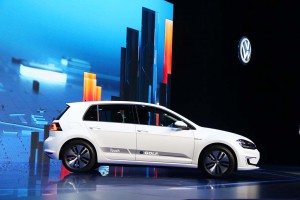
As part of its restitution proposal, the U.S. government is pushing VW to build EVs at its Tennessee plant.
Volkswagen is finding it increasingly difficult to find a path out of the legal morass created by the fallout from the emission scandal that has enveloped the German automaker since late last summer.
Manager Magazin, one of Germany’s leading business publications, reported over the weekend that VW’s senior executives believe it could take until late March, at the earliest, to come up with some kind of settlement with U.S. officials over charges the company cheated emissions tests by equipping nearly a half million cars with a “defeat” device to avoid meeting U.S. standards.
Negotiations have stalled because the U.S. Environmental Protection Agency is “demanding a long distance test of a technical solution proposed by Volkswagen,” the magazine reported.
It also said the overall cost of the recalls and buybacks of the affected vehicles as well as the compensation of customers would be significantly higher than VW expected. The uncertainty over the costs is one of the reasons VW elected to postpone its annual shareholders meeting, which originally was scheduled for late April.
Another German publication, Welt am Sonntag, reported over the weekend that Obama administration is asking Volkswagen to build electric vehicles in the United States as part of the settlement.
(Bond’s Aston Martin DB10 for $3.48 million. For more, Click Here.)
The EPA is currently in talks with Volkswagen with the aim of agreeing on a fix some 500,000 diesel vehicles, which emit up to 40 times legal pollution limits. Pushing VW to build electric cars at its lone U.S. plant in Chattanooga, Tennessee, could put enormous pressure on its North American Operations.
Electric vehicles are expensive to build and require heavy subsidies and incentives to sell. TrueCar, the California car-buying service, reported last week VW was being forced to offer major discounts on its gasoline-powered Jetta.
Welt am Sonntag, which used un-named sources, said the EPA is also asking VW to help build a network of charging stations for electric vehicles in the United States. “Talks with the EPA are ongoing and we are not commenting on the contents and state of the negotiations,” a VW spokesman said. EPA declined to comment, according to Reuters.
Meanwhile, weekly tabloid Bild am Sonntag said Hans Dieter Poetsch, chairman of Volkswagen’s supervisory board, was summoned to a meeting with German transport minister Alexander Dobrindt on Feb. 16 to give an update on the carmaker’s progress in tackling the crisis.
(Click Here to find out what American drivers spend an average of $300 on to fix.)
According to the article, Poetsch pledged Volkswagen would do everything to solve the crisis, regardless of how that might impact individuals and positions at the company.
A new report in the New York Times said internal emails from Volkswagen Group appear to indicate that senior executives knew in 2014 that many of their diesel vehicles had illegal emissions control-cheating software.
Since the scandal became public in September 2015, Volkswagen has said that only a small number of engineers knew about the defeat software that has been found on Volkswagen, Audi and Porsche diesel models.
Martin Winterkorn, CEO of Volkswagen Group when the scandal broke, did not know that any illegal software existed on U.S. cars, VW has insisted. Winterkorn stepped down from his position shortly after the news of the company confirmed it had cheated.
(To check out what’s coming to the Geneva Motor Show, Click Here.)
The Times suggested that if executives were aware that their cars had emissions system cheating software on them before the EPA notified the company that it was in violation of federal rules, Volkswagen Group could face larger fines and penalties than it does now.
